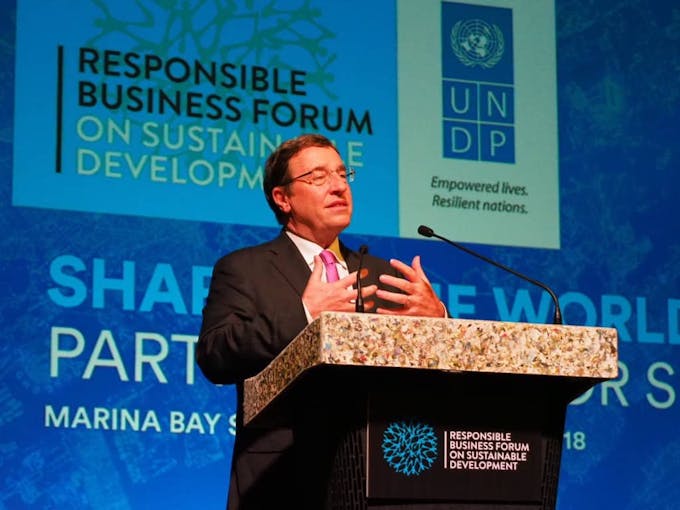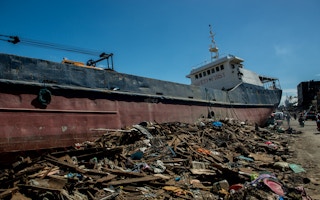It is the biggest climate story of the year, probably the decade.
By 2030, a report from the United Nations’ Intergovernmental Panel on Climate Change (IPCC) revealed last week, the world’s carbon budget for keeping global warming to within 1.5 degrees Celsius will be blown—and dire consequences for the planet will unfold.
Achim Steiner, adminstrator for the United Nations Development Programme, said at the Responsible Business Forum in Singapore on Thursday that humanity had “probably passed the point of no return” and the window of opportunity to prevent the most devastating consequences of climate change has almost shut.

Achim Steiner talking at the Responsible Business Forum in Singapore. Image UNDP Asia Pacific
However, he said that the imperative to act on climate change presented unprecedented opportunities—particularly for businesses, which account for three quarters of the world’s economies.
He implored his audience of business executives to show bold leadership and “don’t be spectators” to climate change. “The markets of tomorrow will judge you on how you respond now,” he said.
Steiner said he found the findings of the IPCC’s report to be “profoundly disturbing”—but how did Asia react?
Eco-Business asked attendees of the Responsible Business Forum how they responded to the IPCC’s report, and what can be done to reduce emissions in time.
“
Personal consumption is important, but advocacy is a thousand times more important.
Lauri Myllyvirta, senior global campaigner, coal and air pollution, Greenpeace
Anita Neville, vice president of corporate communications and sustainability relations, Golden Agri-Resources
How are we in a moment of time when plastics has become an arena for action and innovation, while climate change still struggles to achieve urgent and populist take up? Both issues grew unchecked due to their creeping, insidious nature.
Now the results of plastic use are visibly apparent in our environment, producing a response of disgust and dismay. Climate change has yet to create the same visceral, urgent and personal reaction.
I am struck by the disappointment that lies behind the “ear-splitting wake up call” statement of the UN secretary general. Report after report from IPCC scientists has asked us to wake up and we have still sleepwalked towards disaster. Our eyes should be wide open now.
Lauri Myllyvirta, senior global campaigner, coal and air pollution, Greenpeace
After the IPCC report, there’s been a flurry of “what you can do to avoid the climate crisis” articles that reduce us to consumers. Personal consumption is important, but advocacy is a thousand times more important. Every decision by a Fortune 500 company to source renewable power, a political party to phase out of coal, and a bank to stop financing fossil fuels came about because a few people inside the organisation were tirelessly advocating for the better.
“How to help the climate” fact boxes about taking the train to work and eating fried tofu instead of bacon risk diverting from the fact that collectively we have more power in our professional lives and networks than as consumers. The number one tip I would give is: spend an hour a week leveraging your professional position, network and skills to reduce emissions. Do have that fried tofu though.
Petra Daroczi, ESG ambassador, Thomson Reuters
Investors have a big role to play in the transition to a low-carbon economy—and need to step up. But I don’t see many investors in Asia interested in ESG (environment, social and governance) investing, as they fear they won’t see the returns. The Sustainable Development Goals (SDGs) could be the best way to identify projects to invest in, as there are insufficient standards or a real framework to guide investment in green finance in this region.
“
Uninsured countries are the least developed countries—and yet they are the most exposed to climate change. The straw houses are closest to the wolf.
Alexander Pui, natural catastrophe risk manager, Asia Pacific, Swiss Re
Huiying Ng, founder, Foodscape Collective
We need to create the right social and policy environments for people to make sustainable decisions, but everyone knows that. The question is, how? Businesses can start by investing in alternatives to carbon-intensive food. Governments, banks and philanthropists can do the simplest thing: provide resources that support decentralised, coordinated initiatives to build trust, capacity, skills, and new economies that stop releasing carbon into the air, and start locking it into our soils.
Alexander Pui, natural catastrophe risk manager, Asia Pacific, Swiss Re
The data is there. We can see that the ice is shrinking. Why there hasn’t been action yet is the trillion dollar question. Australia and the United States refusing to commit to the Paris Agreement to the extent that they could—why is that? Uninsured countries are the least developed, and yet they are the most exposed to climate change. The straw houses are closest to the wolf.
Kim Stengert, chief, strategic communication and external relations, WWF-Singapore
Two words: government action. We finally understand the impact that half a degree has. Yet, current emission targets lead us towards a 2.7°C to 3°C world. The IPCC report is a reality check for governments that what they are doing is not enough. The world needs leaders to take bolder and better action.
E Vuthy, deputy secretary general, National Council for Sustainable Development, Cambodia
We don’t have a response to the [IPCC] report yet. We recognise that climate change is a serious issue, but the impacts of climate change have not been as severe in Cambodia as in other countries. The government is formulating a policy for how businesses should respond to climate change, as the private sector is not really aware of the effects of climate change—and that needs to change.
“
The IPCC report is a reality check for governments that what they are doing is not enough.
Kim Stengert, chief, strategic communication and external relations, WWF-Singapore
Stephanie Dickson, founder, Green Is The New Black
I hope that when people read the headlines, they are driven to take action rather than shutting down and justifying to themselves “I’m just one person” or “it’s already too late”. This is not science fiction. It’s real. It’s happening at speed and it’s going to affect us all. Collectively we can turn this around. There is power in numbers.
Professor Lee Poh Seng, deputy director, Centre for Energy Research & Technology, National University of Singapore
Air-conditioning and other types of cooling are the biggest consumers of energy in Southeast Asia, and are major sources of greenhouse gases. If we were to power our air-con units down and take advantage of passive cooling, we could make a major contribution to easing the region’s energy crunch. At the same time, the race is on to develop cleaner, smarter and more efficient cooling technologies, but that will only happen if research and industry work closer together to find the right solutions.
Judy Glazer, global head of sustainability and product compliance, HP Inc.
We’ve responded by focusing on what we can control—our extended value chain, from our supply chain through to our customers. We started measuring greenhouse gas emissions in our supply chain more than 10 years ago, and by doing that our suppliers started to reduce their energy usage. The [IPCC report] reinforces a commitment that we have already made.
Got an idea for how to speed up climate action? Tell us in the comment box below.

















